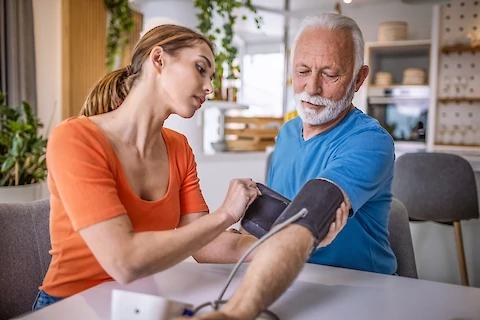
In the rewarding yet challenging journey of caring for our beloved seniors, understanding health metrics like blood pressure is integral. A critical aspect of senior health, blood pressure management can significantly impact their well-being, making it an area family caregivers can't overlook. Today, we'd like to shed light on the basics of blood pressure management for seniors, arming you with key knowledge to help ensure your elderly loved ones lead healthy, happy lives.
Blood Pressure at a Glance
Blood pressure refers to the force that your heart uses to pump blood throughout your body. Maintaining healthy blood pressure levels is essential, especially for seniors, as it allows the body's organs to receive an adequate supply of blood and oxygen. For elderly adults, a normal blood pressure reading is usually below 120/80 mmHg. However, blood pressure can fluctuate based on a variety of factors, including age, stress levels, medical conditions, and lifestyle habits.
Why Is Regular Blood Pressure Monitoring Crucial?
Regularly monitoring their senior loved one's blood pressure is—quite literally—a vital task for caregivers. Fluctuating or consistently high blood pressure levels, known as hypertension, can lead to serious health issues such as heart disease, stroke, and kidney disease. In contrast, low blood pressure (hypotension) can cause dizziness or fainting, which increases the risk of falls—a significant concern for older individuals. As a caregiver, part of your responsibility is ensuring that blood pressure readings are taken consistently and accurately to help manage these potential risks.
Tips for Maintaining Healthy Blood Pressure Levels
Keeping blood pressure levels healthy is a multifaceted task that involves lifestyle modifications and, in some cases, medication. Encourage seniors to follow a balanced diet rich in fruits, vegetables, and low-fat dairy products while limiting sodium intake. Regular physical activity, even gentle exercises like walking or stretching, can also contribute to healthier blood pressure levels. Of course, it's best to consult the senior's healthcare provider before making changes to diet and exercise routines.
Medication adherence is another significant factor. If your elderly loved one has been prescribed medication to manage their blood pressure, ensure they take it as instructed by their healthcare provider. Many seniors take multiple medications, making it easy to miss doses or mix up medications.
Stress management is also key, as high stress levels can contribute to elevated blood pressure. Encourage techniques such as relaxation exercises, deep breathing, and favorite hobbies to help reduce stress levels.
We're Here for You
Managing the health of an elderly loved one is a substantial responsibility, and understanding the nuances of blood pressure management is a big piece of this puzzle. Remember, regular monitoring, maintaining a healthy lifestyle, managing stress, and adhering to prescribed medications can go a long way in maintaining healthy blood pressure levels. As a family caregiver, your role in helping your senior loved one stay healthy is pivotal.
If your senior loved one lives in Seneca, Belton, Liberty, Pickens, or Central and you could use some help with their care, contact us at Senior Helpers Anderson. A leading provider of in-home senior services, we're here to step in and assist with personal care tasks, drop-in companionship, meal preparation, and even light housework, ensuring you're not alone in securing the health and happiness of your elderly loved ones.